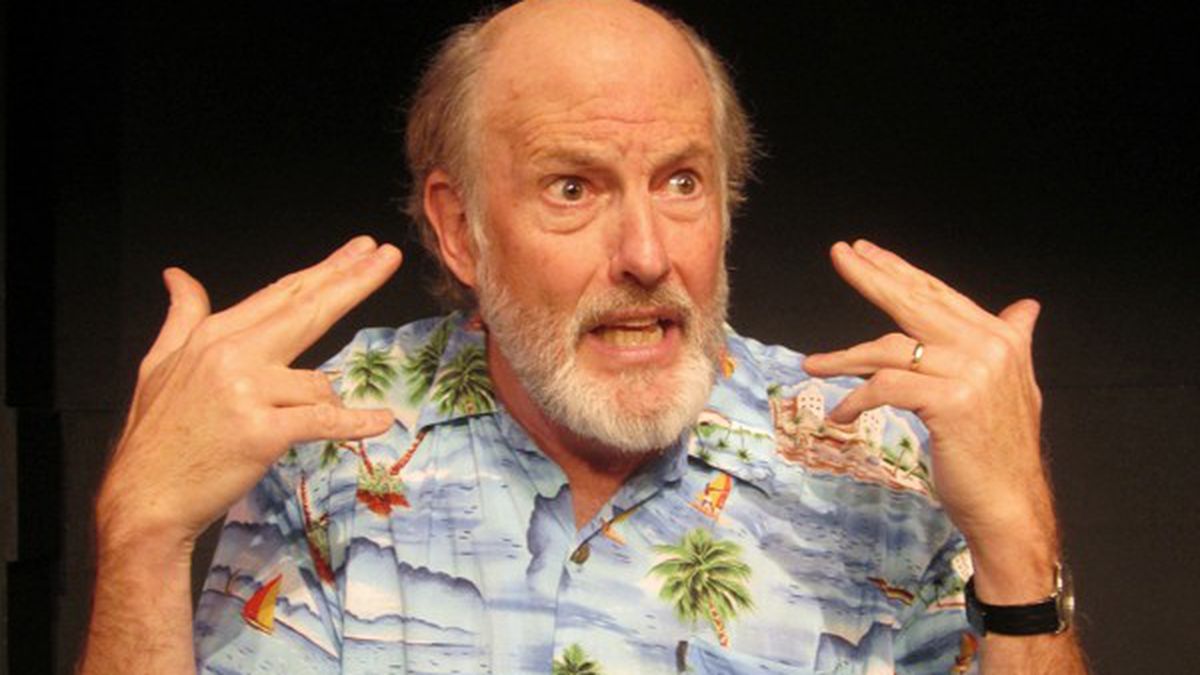When I get to the point in the yoga class when the teacher tells us to close our eyes and say “om,” I do neither. I peek to see who is closing their eyes. I scan the room to see who the true believers are. I’m in it just for the exercise.
Ram Dass is in it for the spiritual enlightenment and the higher consciousness. I am not the optimal audience, then, for ACID TEST: The Many Incarnations of Ram Dass, Lynne Kaufman’s play about the enlightened life and high times of the Hindu spiritual leader.
The play, based on the writings of the hippie spiritualist who wrote Be Here Now, does disseminate a philosophy of yogic awareness and the pursuit of good vibrations. But while I was anticipating the urge to roll my eyes, Ram Dass — or at least Warren David Keith, who plays Ram Dass in this one-man play — is an appealing personality. As it turns out, outmoded relic from the Age of Aquarius that he is, Ram Dass is a thoroughly okay guy to listen to for ninety minutes.
The Ram Dass up on stage is not a self-important blowhard; he has a real sense of humor and true warmth. He refrains from spouting too much mystical mumbo jumbo; he hardly elicits a “sheesh.” Moreover, as the character says, “you don’t have to believe everything you think.”
Before being Ram Dass, the disciple of Hindu guru, Neem Karoli Baba, Dass was Richard Alpert, a rich Jewish kid from suburban Boston. His father, a Boston lawyer, was one of the founders of Brandeis University and the president of the New York, New Haven and Hartford Railroad. The younger Alpert became a tenured professor at Harvard University at age 29 and went on to take 377 LSD trips and work with Timothy Leary in research with psychedelics at Harvard. He was kicked out of Harvard, thereafter.
Later in life, Dass founded several charitable organizations, including SEVA, an international health organization based in Berkeley. He suffered a debilitating stroke and has written about that. He now teaches via a website from his home in Hawaii.
So the title of Kaufman’s play, The Many Incarnations of Ram Dass, is certainly an apt one. But the show, which is essentially a dramatic recreation of a greatest-hits lecture medley from an imitation of a secondary figure in the psychedelic movement, is, by its very nature, an inauthentic experience. Like a souvenir tie-dyed T-shirt sold on Telegraph Avenue or Haight Street.
It’s to the credit of Warren David Keith that this recreation works as well as it does. Director Joel Mullennix’s pacing keeps the production fluid and engaging. Kaufman has well consolidated an eclectic lifetime into an evening’s entertainment. Still, the spiel is laden with aphorisms and pat wisdom about mystical pathways to out-of-body awareness, transcendence, and pure and unadulterated grooviness.
Ram Dass begins by thanking us for being here — now. (Chuckle.) He speaks from a chair, his body and voice crippled from his stroke. His words are slow and labored so he soon steps out of his post-stroke condition. Through the magic of theater, he will make a full recovery for the purposes of storytelling.
He promises not to use too many “woo-woo words,” and his manner is friendly and accessible. He translates his ideologies and spiritual pedagoguery into bite-sized, fun-sized pieces.
Much of the rest of the play involves funny stories, the kind that stoners tell each other about the wild things that happened when they were high: playing baseball in Mexico when they were so high they accidentally played really well; getting stopped by a state trooper for driving too slow and believing the state trooper was Krishna.
Other episodes are geared toward the touching. Dass tells of the final stages of his father’s life. While Dass’ counterculture adventures were wacky to his father, his dad always supported him and even represented his son’s commune in a lawsuit filed by the town of Newton, Massachusetts. Dass’ account of his father’s positivity is a sentimental tribute to the man, and it’s played for schmaltz.
Dass, a man who shows himself to be intellectually curious with an appealing sense of humor about himself, delves into mumbo jumbo and hocus pocus when he recounts the magical powers of Maharaj-ji, his guru.
After all the truths are told, the life lessons shared, the aphorisms aphorized, Dass’ teachings are mostly predictable nuggets. Still, aging hippies who enjoy a nice stroll down memory lane and second-generation spiritualists will enjoy the Kool-Aid.














